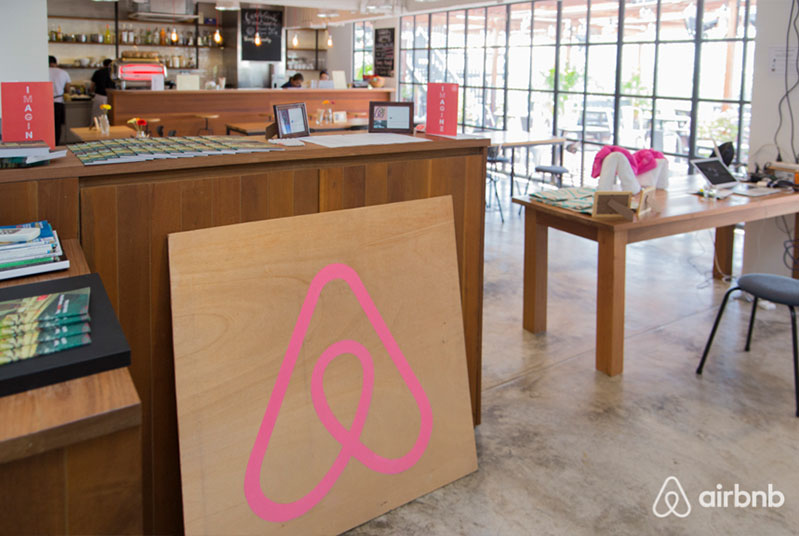Airbnb celebrates its 12th anniversary!

Airbnb anniversary: how the company is surviving the corona crisis. Source: flickr.com
Today, the largest accommodation platform in the world celebrates its 12th anniversary. Unfortunately, the global crisis related to the pandemic lockdown and the travel ban has stolen some of the fun out of this year’s festive mood. Nevertheless, Airbnb is already seeing some silver lining in the dark clouds hanging over the tourism industry. Let’s check out on the birthday company amidst the global turmoil.
Pandemic impact on Airbnb operations

On May 5, 2020, Airbnb Co-Founder and CEO Brian Chesky addressed all the company’s employees with a sad piece of news. The global travel ban has hit the company very hard. Namely, its internal valuation decreased by 16% and equaled $26B in April. Along with the incredible financial losses, the corporate management expected irrevocable changes in the nature of the travel business itself. Therefore, it was time for a complete update of the current strategy.
While we know Airbnb’s business will fully recover, the changes it will undergo are not temporary or short-lived. Because of this, we need to make more fundamental changes to Airbnb by reducing the size of our workforce around a more focused business strategy.
Out of our 7,500 Airbnb employees, nearly 1,900 teammates will have to leave Airbnb, comprising around 25% of our company. Since we cannot afford to do everything that we used to, these cuts have to be mapped around a more focused business.
Thankfully, those who were laid off were not left behind. These employees will receive a generous severance package that includes several months’ pay, a year of healthcare, as well as four months of mental health support, and help from Airbnb finding new jobs, as reported by Business Insider.
Brian Chesky remains optimistic about the future of the business as well. He claims that Airbnb will weather this storm as it has done before and will come back stronger than ever once life returns to normal. Nevertheless, the company needs to make great efforts to return from the verge of collapse.
Consequences for travelers and hosts

Consequences for travelers and hosts. Source: pixabay.com
Meanwhile, the corporate policies regarding travel cancellations faced severe criticism from the platform hosts. In March, Airbnb announced that it would allow travelers to cancel their reservations and get a full refund without any explanation. As a result, Airbnb had more than $1 billion worth of cancellations, Chesky told USA TODAY. This unexpected move contradicted many property managers’ individual cancellation policies. Hence, some hosts expressed their indignation.
Therefore, the company decided to aid property owners as well. Airbnb set aside $250 million to reimburse hosts for 25% of the revenue they lost. It preserved another $10 million for so-called Superhosts — highly-rated managers of popular properties — to help them pay their rent or mortgages.
As for the tourists, currently, the given protection policy applies:
Reservations for stays and Airbnb Experiences made on or before March 14, 2020, with a check-in date between March 14, 2020, and August 31, 2020, are covered by the policy and may be canceled before check-in. However, if a reservation has already begun (the check-in has passed) this extenuating circumstance does not apply.
Reservations made on or before March 14, 2020, with a check-in date after August 31, 2020, are not currently covered for COVID-19 related circumstances.
Those who reserved a stay after March 14, 2020, cannot apply for a coronavirus-related cancellation unless the guest or the host is currently sick with COVID-19. Such cases will need to be confirmed.
Guests who cancel will have a refund option. They will receive a full cash refund or travel credit for the amount they have paid (where travel credit is available).
Hosts can cancel such reservations too without charge or impact to their Superhost status. The host’s cancellation policy will apply as usual to reservations made after March 14, 2020 (when WHO announced COVID-19 to be a pandemic). The extenuating circumstances policy no longer applies, because COVID-19 and its consequences stopped being unforeseen or unexpected.
Please, note that the situation in the world is changing and the policies will be constantly reviewed. New updates (if any) will be published on the 1st and the 15th of each month.
If you’re a guest, you can find cancellation and refund options by going to the Trips page and choosing your trip. If you’re a host, you’ll find relevant information in your hosting dashboard.
How to cancel a trip on Airbnb and get a refund

How to cancel a trip on Airbnb and get a refund. Source: flickr.com
If your trip meets the criteria of the extenuating circumstances policy, you’ll need to document or attest that you’re unable to complete your reservation because of COVID-19. For instance, you can provide a link to the government site where travel restrictions are described, or scan a certificate from your healthcare institution proving you’re unable to make a trip due to COVID-19.
- Go to the Trips menu, enter your login details and find the trip you want to cancel
- Click or tap Show trip details
- When the overview opens, click or tap Show details
- Then click or tap Change or cancel
You’ll be taken to a new page where you can choose to either change or cancel your reservation. If you choose Cancel, you’ll be taken through the cancellation process, where you can check out your particular options, size and means of a possible refund, etc. If needed, you should download the documented proof that your case is eligible for a full cash refund.
If the cancellation policy doesn’t provide a full refund at the time you cancel, you’ll be given an option to ask the host for a full refund before you finalize the cancellation. If they agree, they can use the Resolution Center to safely transfer money to you.
Don’t forget to review your cancellation before you submit it.
Please, note that getting your money back may take a while. There’s an internal review process that may cause delays. Many of those who were covered by the extenuation policy complained to CNBC that they’re offered travel credits they don’t want instead of cash, and they cannot get full cash refunds unless they show documentation proving that they’re subject to travel restrictions.
For some tourists, it has taken over a month to receive their cash back. Others have resorted to emailing the CEO or writing angry posts on social media in hopes of having their money returned. So we could only advise that you be patient.
Future prospects

Some shifts in traveling habits have already been traced. Source: shutterstock.com
Airbnb’s CEO, Brian Chesky predicts the following implications for the tourism industry:
- People will book stays closer to home.
- Travelers will want more affordable options.
- There will be a desire for private spaces.
- Cleanliness will be more important than ever.
- People will book more trips at the last minute.
The demand for stays has already started to rebound. On July 8, guests booked more than 1 million nights’ worth of future stays at Airbnb listings around the world. It’s the first day since March 3, that this threshold has been reached. This exciting news gives Airbnb hosts hope.
Some shifts in traveling habits have already been traced. Nicolas Vigier, whose agency manages 60 Airbnb apartments, says he is slowly seeing demand coming in for summer rentals in the south of France. His experience confirms the first insight of Airbnb’s CEO.
Before the crisis, our clients were 90 to 95 percent foreigners
But now his demand is coming from French citizens only. It may be a great time for developing internal tourism perspectives.
Many countries are already supporting the initiatives of a staycation – a holiday that you take at home or near your home, rather than traveling to another place. For instance, New Brunswick authorities want their residents to have a staycation within the province this summer as a result of COVID-19 restrictions. Hence, they have announced a 20% rebate system to encourage it. More than 30 hotels in Singapore have been approved to welcome guests looking for a little staycation and ready to visit local attractions. Some discounts are also available at popular travel platform Klook.
The Airbnb accommodation platform also suggests its hosts adding more flexibility to their booking policies. Airbnb advises:
- Adopt a more flexible cancellation policy.
- Open your calendar for longer stays—and offer weekly or monthly discounts.
- Let guests know your space has the amenities they need right now. Currently, pools and pet-friendly properties are becoming more popular.
- Offer self-check-in for those wishing to avoid personal contact.
- Review your cleaning routine. Please, check the Airbnb’s enhanced cleaning protocol and cleaning tips.
- Consider updating your listing title and description with COVID-19 related aspects to attract guests, and make sure you’re following the content guidelines.
Moreover, you can participate in new online experiences provided by the platform. For instance, this month Airbnb has launched a new curated collection of Online Cooking Experiences hosted by Michelin-starred and world-renowned chefs.
Along with the International Olympic Committee (IOC) and the International Paralympic Committee (IPC), Airbnb is also announcing a five-day summer festival featuring more than 100 Olympian and Paralympian Online Experiences, hosted virtually by some of the world’s best athletes.
Meanwhile, in June – the beginning of Pride season – the LGBTQ+ community and allies were able to travel virtually and join Online Experiences led by hosts across the globe from the comfort of their living room.
SEE ALSO:









